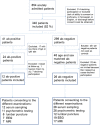A prospective three-year follow-up study on the clinical significance of anti-neuronal antibodies in acute psychiatric disorders
- PMID: 31896766
- PMCID: PMC6940359
- DOI: 10.1038/s41598-019-56934-6
A prospective three-year follow-up study on the clinical significance of anti-neuronal antibodies in acute psychiatric disorders
Abstract
The clinical significance of anti-neuronal antibodies for psychiatric disorders is controversial. We investigated if a positive anti-neuronal antibody status at admission to acute psychiatric inpatient care was associated with a more severe neuropsychiatric phenotype and more frequent abnormalities during clinical work-up three years later. Patients admitted to acute psychiatric inpatient care who tested positive for N-methyl-D-aspartate receptor (NMDAR), contactin-associated protein 2 (CASPR2) and/or glutamic acid decarboxylase 65 (GAD65) antibodies (n = 24) were age - and sex matched with antibody-negative patients (1:2) from the same cohort (n = 48). All patients were invited to follow-up including psychometric testing (e.g. Symptom Checklist-90-Revised), serum and cerebrospinal fluid (CSF) sampling, EEG and 3 T brain MRI. Twelve antibody-positive (ab+) and 26 antibody-negative (ab-) patients consented to follow-up. Ab+ patients had more severe symptoms of depression (p = 0.03), psychoticism (p = 0.04) and agitation (p = 0.001) compared to ab- patients. There were no differences in CSF analysis (n = 6 ab+/12 ab-), EEG (n = 7 ab+/19 ab-) or brain MRI (n = 7 ab+/17 ab-) between the groups. In conclusion, anti-neuronal ab+ status during index admission was associated with more severe symptoms of depression, psychoticism and agitation at three-year follow-up. This supports the hypothesis that anti-neuronal antibodies may be of clinical significance in a subgroup of psychiatric patients.
Conflict of interest statement
The authors declare no competing interests.
Figures


References
-
- Irani SR, et al. Antibodies to Kv1 potassium channel-complex proteins leucine-rich, glioma inactivated 1 protein and contactin-associated protein-2 in limbic encephalitis, Morvan’s syndrome and acquired neuromyotonia. Brain: a journal of neurology. 2010;133:2734–2748. doi: 10.1093/brain/awq213. - DOI - PMC - PubMed
-
- Pollak TA, McCormack R, Peakman M, Nicholson TR, David AS. Prevalence of anti-N-methyl-D-aspartate (NMDA) receptor [corrected] antibodies in patients with schizophrenia and related psychoses: a systematic review and meta-analysis. Psychological medicine. 2014;44:2475–2487. doi: 10.1017/S003329171300295X. - DOI - PubMed
MeSH terms
Substances
LinkOut - more resources
Full Text Sources
Medical

